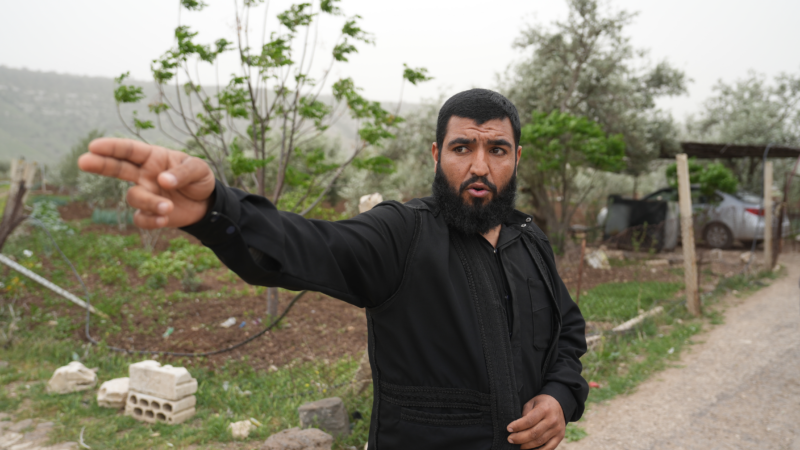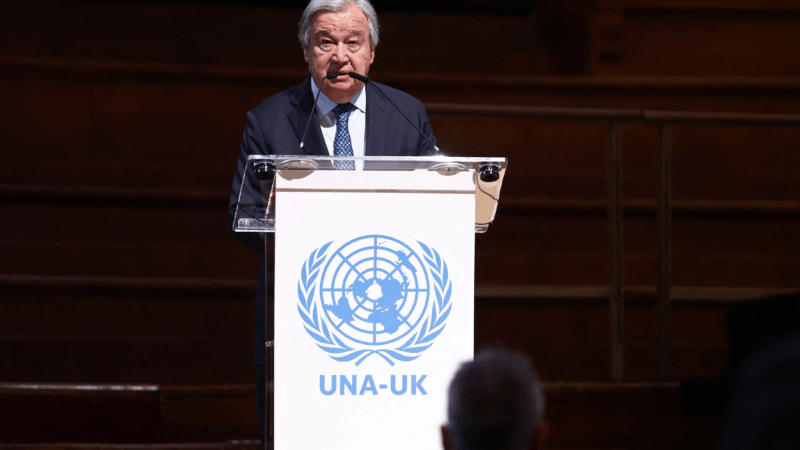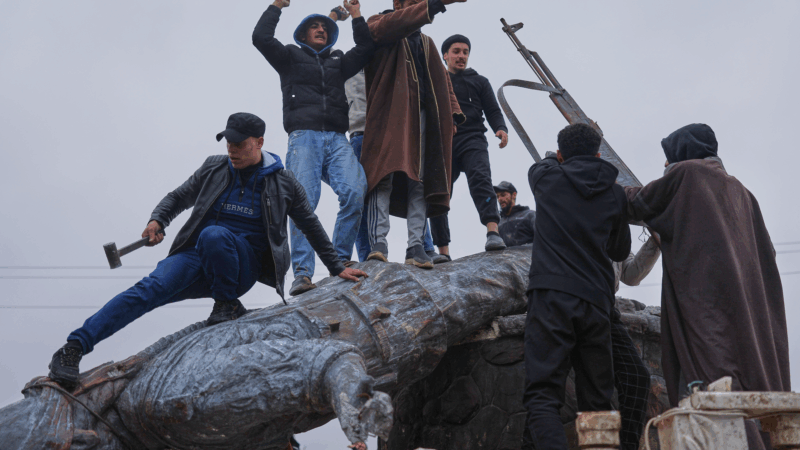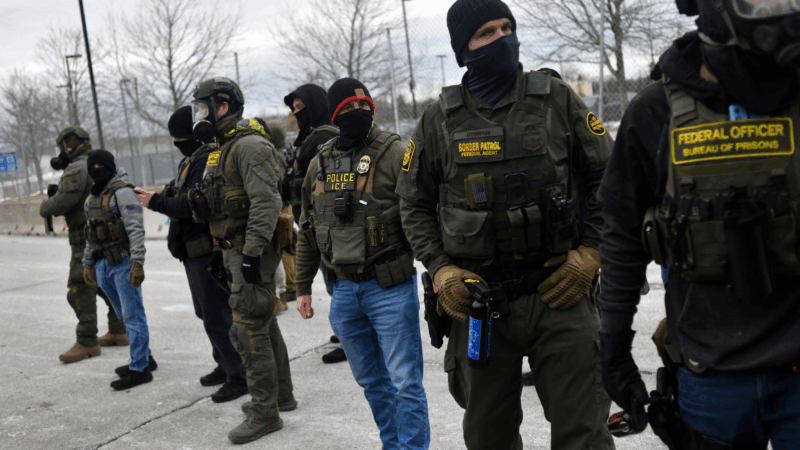Syria’s dictator is gone. Its civil war is over. But Israel keeps attacking
KOAYIAH, Syria — A panicked phone call, then explosions.
Abdul Rahman Hamdan recalls how his uncle called him from their family’s olive grove early one morning last month. He and his neighbors were rushing out with hunting rifles, to confront Israeli troops who had just killed two farmers on the edge of their village.
Hamdan, 32, ran to join them. But by the time he reached the olive grove, 15 minutes later, Israeli artillery was exploding all around. Helicopters and drones were buzzing overhead. And the dead body of his uncle, Ameen Suleiman, was being loaded onto a motorbike. He was one of seven people killed that day, March 25, by Israeli troops who invaded their village, Hamdan and several neighbors told NPR.
The Israeli military confirmed their account, but called the dead people “terrorists.” Villagers say all of the casualties were civilians, some defending their property with shotguns they normally use against wild boars, others unarmed, trying to run away.
“We were fleeing!” says Aza Mohamed, 40, a mother of six who lost her leg below the knee to an Israeli artillery shell. NPR met her at her father’s house, where she lay on a sofa with her bandaged leg propped up, receiving condolences. “I just want to be able to walk again, so that I can take care of my children.”

Israel used to attack Syria frequently, targeting Iranian weapons being funneled through the country to Hezbollah militants in neighboring Lebanon. But those supply routes were cut off with the ouster of Syria’s authoritarian president, Bashar al-Assad, in December. Since then, Syria’s new leaders have arrested Hezbollah militants, and zero attacks on Israel have originated in Syria.
But Israel has nevertheless struck Syria at least 780 times since then, according to data compiled by Charles Lister, a Syria expert who runs the Syria Weekly newsletter. Residents say the attacks challenge their sovereignty, threaten their livelihood and hobble their efforts to build a new country after nearly 14 years of civil war.
Since Assad’s fall, hundreds of Israeli attacks on Syria
In early April, Israeli airstrikes destroyed an airport and military infrastructure in the Syrian provinces of Hama and Homs, a scientific research building in the capital Damascus, and many homes in villages like Koayiah, where Hamdan and Mohamed live, near Syria’s borders with Jordan and the Israeli-occupied Golan Heights.

Aerial photos also show Israeli troops building fortifications inside Syria, beyond a buffer zone with the Golan, which Israel seized in 1967 and still occupies today. Syrian residents fear a land grab beyond those disputed borders.
The Israeli military tells NPR it’s been targeting Syria’s military capabilities, to disarm the country’s south and prevent the “formation” of any threat to Israeli civilians.
While Syrian forces have not targeted Israel, the country’s new president, Ahmed al-Sharaa, used to have ties to al-Qaida. During Syria’s civil war, various extremist groups took control of huge swaths of the country. A small cluster of villages in the south, including Koayiah, were even occupied by ISIS from 2015 to 2018 — a period residents recalled as the most brutal in their history. Now they’re worried about a possible Israeli occupation.
On April 5, the Israeli military published video of paratroopers blowing up confiscated tanks and rocket launchers it said they uncovered in southern Syria, not far from Koayiah.
In the days after Assad’s ouster, Syria’s new government was still forming. It didn’t have the means to counter attacks by Israel, and said it wanted cordial relations. It’s still recruiting new police and security forces, and struggling to extend its control over all of Syria.
But as violence has mounted, Syria’s new leaders have found their voice. In an April 3 statement, the Foreign Ministry denounced what it called a “wave of Israeli aggression” that violates international law and threatens to “destabilize Syria and prolong the suffering of its people.”
U.N. peacekeepers in the area
On March 29, Mosab al-Abdallah was picking zucchini on his family’s farm near Koayiah, when Israeli soldiers rolled up onto his property in two jeeps. Abdallah was frightened.
The Israelis took Abdallah, 22, and seven other farmers — at gunpoint, he says — into Israeli territory for questioning. After several hours, they drove them back into Syria and dropped them off with a warning to stay off their own farms, otherwise their crops would be bulldozed.
The Israeli military confirmed Abdallah’s account, saying it released the eight farmers after determining they were “not involved in terrorist activities.” But it said Abdallah’s farm now lies in a “closed military zone” and that he’s prohibited from returning to it.
The next day, Abdallah reported this incident to United Nations peacekeepers, who have an outpost about 6 miles from his farm. They’re part of the U.N. Disengagement Observer Force or UNDOF, tasked with maintaining an Israel-Syria ceasefire that goes back to the 1973 Yom Kippur war.

Abdallah says UNDOF told him it was OK to return to his land, and that they’d report the incident. But three days later, he was back picking zucchini, when two Israeli jeeps pulled up — and Abdallah ran.
“I’m worried I might not make it home if they take me again,” he told NPR. “I’m scared. If I can’t harvest my land, I’ll go hungry.”
Abdallah decided to return to the UNDOF base, and ask for guidance. NPR accompanied him. A female U.N. peacekeeper answered a big blue metal door, and spoke to Abdallah through a grate. But they had difficulty. The peacekeeper didn’t speak Arabic, didn’t ask for Abdallah’s name, and didn’t offer any advice. She said she’d make another report. He offered his phone number — but says he never got a callback the last time he came.
Afterward, NPR asked the U.N. for an update on his case. In an email, UNDOF confirmed Abdallah’s account, and said its peacekeeping force “continues to engage” with the Israeli military “on the complaints raised by civilians” and what it called Israeli “violations” of a 1974 ceasefire agreement.
Abdallah remains in limbo.
Transcript:
AILSA CHANG, HOST:
Almost immediately after the fall of dictator Bashar al-Assad, Syria came under attack. Israel has struck Syria several hundred times since December, and until recently, Syria’s new government stayed quiet. NPR’s Lauren Frayer reports from one village that was hit.
LAUREN FRAYER, BYLINE: Abdul Rahman Hamdan walks through his family’s olive grove, recounting how his uncle called him from here in a panic last month. Israeli troops had crossed into Syria when Assad fell. At the time, Syria’s new government was just forming. It didn’t have the means to counter Israel and said it wanted cordial relations, but Israeli troops were now moving deeper into Syria. They were bombing infrastructure and seizing land in Hamdan’s village.
ABDUL RAHMAN HAMDAN: (Non-English language spoken).
FRAYER: His uncle told him he and his neighbors were rushing out with hunting rifles after Israeli troops killed two farmers. The villagers fired first at Israeli troops on their property. The response, he says, was disproportionate.
HAMDAN: (Non-English language spoken).
FRAYER: Israeli helicopters, drones, artillery – Hamdan shows me the call log on his phone.
HAMDAN: (Through interpreter) 9:15.
(Non-English language spoken).
FRAYER: In the morning.
HAMDAN: (Through interpreter) He died 9:30. He was killed 9:30.
FRAYER: His uncle was one of seven people killed by Israeli troops who entered their village that day. The Israeli military called them terrorists.
AZA MOHAMED: (Non-English language spoken).
UNIDENTIFIED PERSON: (Non-English language spoken).
FRAYER: People like Aza Mohamed, a mother of six who lost her leg to an Israeli artillery strike.
A MOHAMED: (Non-English language spoken).
FRAYER: She lays on a bed, bandaged and helpless in the house of her father, Hani Mohamed…
HANI MOHAMED: (Non-English language spoken).
FRAYER: …Who says some in Syria are downplaying these attacks out of fear. Some of the older folks used to go to school just west of here in the Golan Heights, before Israel seized that territory in 1967 and still occupies it today.
(SOUNDBITE OF BABY CRYING)
FRAYER: Israel used to attack Iranian weapons being funneled through Syria to Hezbollah in neighboring Lebanon, but those routes were cut off with Assad’s ouster. Since then, Syria has arrested Hezbollah militants and zero attacks on Israel have originated here. But Israel has launched several hundred air and artillery strikes like these, saying it wants to prevent the formation of any threat.
(SOUNDBITE OF ENGINE CHUGGING)
MOSAB AL-ABDALLAH: (Non-English language spoken).
FRAYER: A farmer named Mosab al-Abdallah zips up on his motorbike, out of breath. He’s just run from Israeli soldiers.
AL-ABDALLAH: (Non-English language spoken).
FRAYER: He says this is the second time they’ve come onto his farm in Jeeps. Last month, he was harvesting zucchini when they took him and seven other farmers at gunpoint, he says, into Israel for questioning. They dropped him back off with a warning to stay off their own land. The Israeli military confirmed his account, calling his farm a closed military zone now.
AL-ABDALLAH: (Through interpreter) We reported to the U.N.
FRAYER: One possible recourse for Abdallah is United Nations peacekeepers stationed nearby.
(SOUNDBITE OF WIND BLOWING)
FRAYER: OK, we’re at the door of this U.N. base. No entry. Authorized personnel only.
(SOUNDBITE OF KNOCKING)
FRAYER: A U.N. peacekeeper answers the big, blue metal door topped with barbed wire.
(SOUNDBITE OF METAL CLANKING)
UNIDENTIFIED PEACEKEEPER: Hi.
FRAYER: She asks me to stop recording…
UNIDENTIFIED PEACEKEEPER: Please can you stop recording?
FRAYER: …And speaks to Abdallah through a grate. But it’s difficult. She doesn’t speak Arabic. She doesn’t ask for his name. She says she’ll make a report. He offers his phone number, but he never got a call back the last time he did this, either. NPR asked the U.N. for an update on his case. It replied that it continues to engage with the Israeli military about what it calls its violations in this area.
AL-ABDALLAH: (Non-English language spoken).
FRAYER: As Abdallah walks away, he says he feels really let down. He’s scared to go back to his farm, but if he can’t harvest his land, he’ll go hungry, he says. A day later, dozens of Israeli military vehicles entered Syria again near here. Afterwards, Syria’s new government found its voice. It called these attacks a, quote, “clear Israeli attempt to normalize violence,” undermining Syria’s efforts to rebuild after 14 years of civil war. Lauren Frayer, NPR News, in Daraa, Southern Syria.
(SOUNDBITE OF MUSIC)
High-speed trains collide after one derails in southern Spain, killing at least 21
The crash happened in Spain's Andalusia province. Officials fear the death toll may rise.
United Nations leaders bemoan global turmoil as the General Assembly turns 80
On Saturday, the UNGA celebrated its 80th birthday in London. Speakers including U.N. Secretary-General António Guterres addressed global uncertainty during the second term of President Trump.
Parts of Florida receive rare snowfall as freezing temperatures linger
Snow has fallen in Florida for the second year in a row.
European leaders warn Trump’s Greenland tariffs threaten ‘dangerous downward spiral’
In a joint statement, leaders of eight countries said they stand in "full solidarity" with Denmark and Greenland. Denmark's Prime Minister Mette Frederiksen added: "Europe will not be blackmailed."
Syrian government announces a ceasefire with the Kurdish-led Syrian Democratic Forces
Syria's new leaders, since toppling Bashar Assad in December 2024, have struggled to assert their full authority over the war-torn country.
U.S. military troops on standby for possible deployment to Minnesota
The move comes after President Trump again threatened to invoke the Insurrection Act to control ongoing protests over the immigration enforcement surge in Minneapolis.







